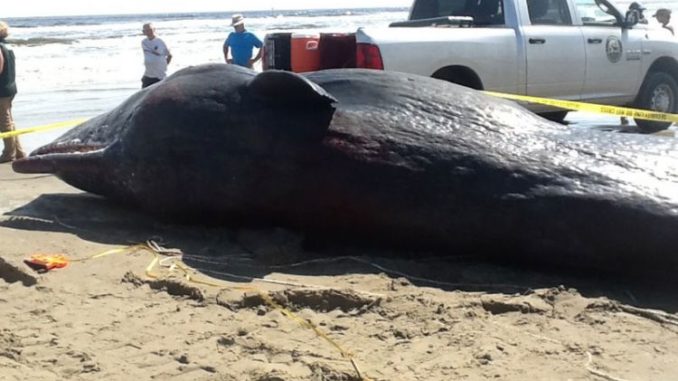
No cause of death yet, whale was an older juvenile or young adult female, LDWF says
Biologists with the Louisiana Department of Wildlife and Fisheries haven’t yet determined the cause of death of a young adult female sperm whale found dead Saturday just off the Grand Isle beach.
A necropsy was performed on the whale, and the organs and tissues will be analyzed in a lab in an effort to determine how the animal died.
“It is important to note that sometimes we may not be able to identify an exact cause of death,’’ said LDWF biologist Mandy Tumlin, the state’s marine mammal stranding and rescue program coordinator. “However, each and every stranding is important for obtaining valuable information about each of these species, especially in this case of an endangered species such as the sperm whale.’’
The whale on Grand Isle was the third one found stranded along the Louisiana coast within the past year, and the fifth standing of the endangered species along the northern Gulf of Mexico.
“Sperm whales found in the Gulf of Mexico are generally smaller than those found in other locations,’’ Tumlin said. “This animal was a female and they tend to be a lot smaller than males in this species. Sperm whales only have teeth on the lower jaw, those teeth have been collected and can be used in determining the age of the animal.’’
LDWF encourages the public to report any marine mammal strandings to the NOAA Southeast Region Marine Mammal Stranding Network Hotline at 1-877-433-8299. To report marine mammal violations, such as people feeding, attempting to feed, or harassing marine mammals in the wild, please contact the national NOAA Fisheries Enforcement Hotline at 1-800-853-1964. Information may be left anonymously.
Sperm whales are protected by the Marine Mammal Protection Act and the Endangered Species Act. It is illegal to harass or interact with marine mammals whether they are dead or alive.
The LDWF asked for the public’s help and offered suggestions on what to do if you encounter a marine mammal:
DO immediately report all dead marine mammals, even if they are decomposed. Call the Southeast Region Stranding Network 24-hour hotline: 1-877-WHALE HELP (1-877-942-5343) to be connected to your state’s marine mammals stranding network. The stranding network will send out trained responders who will get to the scene quickly with appropriate equipment.
DON’T push the animal back out to sea. Stranded marine mammals may be sick or injured. Returning animals to sea delays examination and treatment and often results in the animal re-stranding in worse condition.
If the animal returns to the water on its own, DON’T attempt to interact with it (swim with, ride, etc.).
DO put human safety above animal safety. If conditions are dangerous, do not attempt to approach the animal.
DO stay with the animal until rescuers arrive, but use caution. Marine mammals can be dangerous and/or carry disease. Keep a safe distance from the head and tail. Also, minimize contact with the animal (use gloves if necessary) and avoid inhaling the animal’s expired air.
If the animal is alive, DO keep its skin moist and cool by splashing water over its body. Use wet towels to help keep the skin moist and prevent sunburn.
If the animal is alive, DON’T cover or obstruct the blowhole. Try to keep sand and water away from the blowhole.
DO keep crowds away and noise levels down to avoid causing further stress to the animal.
DO keep dogs/pets away from a living or dead marine mammal.
DON’T collect any parts (tissues, teeth, bones, or gear, etc.) from dead animals. They are still covered by the Marine Mammal Protection Act.